“I have a tsp question for you concerning the new TSP withdraw options. I retired in 2015 from air traffic control at age 50. Will I be able to make a withdrawal? I would like to withdraw maybe $20000 to help pay some debt. If I can do that what is the tax rate and what will it do to my taxes at the end of the year? Thank you for any help you can give. I’m not sure who I can ask these questions. I’ve read the fact sheet but it doesn’t address this specifically.” – Susan
Many federal employees and retirees find themselves in a financial pinch and consider using their Thrift Savings Plan (TSP) to pay off debt, especially when facing high-interest rates of credit cards and personal loans. However, withdrawing from your TSP can have serious financial consequences both now and in the future. Let’s explore the key considerations, tax implications, and alternatives to make an informed decision.
Understanding TSP Withdrawals
The TSP is a retirement savings plan for federal employees and members of the uniformed services, similar to a 401(k). It offers tax-advantaged growth, but withdrawals are subject to income taxes and, in some cases, penalties. For example, if you withdraw before age 59½, you may face a 10% early withdrawal penalty tax in addition to regular income taxes.
Tax Consequences of Withdrawing from TSP
When you withdraw money from your TSP, the amount is added to your taxable income for the year of the withdrawal. This means you could owe a significant amount in taxes. For instance, if you withdraw $20,000 and are in the 22% federal tax bracket, you will owe $4,400 in federal taxes. State taxes may apply as well, further reducing the amount you actually receive.
The True Cost of a TSP Withdrawal
Some financial advisors suggest using TSP funds to pay off high-interest debt, such as credit card balances. However, this overlooks several factors:
- Lost Investment Growth: By withdrawing from your TSP, you lose the potential growth of those funds over time. If your TSP earns an average of 8% annually, that $20,000 could grow significantly in retirement.
- Tax Impact: You are taxed on the withdrawal, reducing the amount available to pay off debt.
- Spending Habits: Paying off debt without addressing the cause may lead to accumulating new debt, creating a cycle of financial stress.
Alternatives to Withdrawing from TSP
Before using your TSP to pay off debt, consider these options:
- Budget Adjustments: Track expenses and find areas to cut back.
- Debt Consolidation: A lower-interest loan may reduce your monthly payments.
- Increasing Income: Side jobs, overtime, or selling unused items can help generate extra cash.
- Snowball or Avalanche Method: Pay off smaller debts first for momentum or target high-interest debt first to save money over time.
Final Thoughts
Withdrawing from your TSP to pay off debt should be a last resort. While the TSP offers flexible withdrawal options, the tax consequences and long-term impact on retirement savings must be carefully considered. If you’re facing financial challenges, speaking with a financial advisor or reviewing resources on retirement and TSP withdrawals can help you make an informed decision.
References

ABOUT THE AUTHOR
Micah Shilanski, CFP®, is a distinguished financial planner known for his deep commitment to providing personalized advisory services to his clients. As the founder of Plan Your Federal Retirement, Micah has dedicated his career to helping federal employees understand and optimize their benefits to help ensure a secure and prosperous retirement. His experience is widely recognized in the industry, making him a sought-after speaker and educator on financial planning and retirement strategies.
Micah’s approach is client-centered, focusing on creating personalized strategies that address each individual’s unique needs. His work emphasizes the importance of comprehensive planning, incorporating aspects of tax strategy, investment management, and risk assessment to guide clients toward achieving their financial goals.



